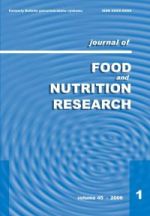Scientific journal
Journal of Food and Nutrition Research
Summary No. 4 / 2014
Sádecká, J. – Polovka, M. – Kolek, E. – Belajová, E. – Tobolková, B. – Daško, Ľ. – Durec, J.
Orange juice with pulp: Impact of pasteurization and storage on flavour, polyphenols, ascorbic acid and antioxidant activity
Journal of Food and Nutrition Research, 53, 2014, No. 4, s. 371-388
Martin Polovka, Department of Chemistry and Food Analysis, VÚP Food Research Institute, National Agricultural and Food Centre, Priemyselná 4, P. O. Box 25, SK-82475 Bratislava, Slovakia. Tel: 00421 2 50237 195, fax: 00421 2 55571 417, e-mail: polovka@vup.sk
Summary: Effect of storage on volatile aroma compounds of orange juice with pulp of Brazilian origin processed in Slovakia was investigated during 4 months of its expiration period. Headspace – solid phase microextraction (HS-SPME) and gas chromatography – mass spectrometry (GC-MS) detection was involved to isolate and analyse the composition of the volatile fractions. Parallel gas chromatography – olfactometry (GC-O) analysis revealed forty-four key odorants, and their changes within the expiration period were characterized. D-Limonene, alpha-phellandrene, nonanal, decanal, linalool, L-limonene, ethyl octanoate, ethyl butanoate, nonanol and alpha-copaene were found to be principal aroma-active volatiles from the viewpoint of high and practically stable odour intensity during the shelf-life of the juice. Besides that, the results proved that aroma composition and overall flavour of orange juice changed during the storage. In addition, complementary measurements of ascorbic acid concentration, antioxidant activity, total polyphenols concentration and colour changes in the stored juice were carried out proving gradual worsening of all these parameters during the storage.
Keywords: orange juice; volatiles; storage; pasteurization; antioxidant properties; ascorbic acid; polyphenols
Download:
(pdf, 588.44 Kb, 8580x)










